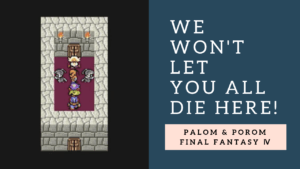Let’s learn Japanese with Noctis’s quote from Final Fantasy XV.
CONTENTS
Video
Noctis’s Quote
Japanese: 常に胸を張って生きろ。
Romaji: tsune ni mune o hatte ikiro.
English: Always walk tall.
Analysis
常に means “always”. You can also say いつも instead but 常に sounds a bit more formal. In many cases, 常に and いつも are interchangeable, but there are times when you can only use いつも. It is when talking about a habit that takes place on a regular basis in a certain condition.
胸を張って means “proudly” or “confidently”. 胸を張る is a verb literally meaning “to push your chest out” which makes you look confident and this te-form of the verb means “in a certain state”.
生きろ is the imperative form of 生きる meaning “to live”. This form is used to give an order or command to people in a lower status or equal in male speech.
Examples
常に/いつも (always)
常に健康に気を使っている。
tsune ni kenkō ni ki o tsukatte iru.
I always take care of my health.
あの二人はいつも一緒にいる。
ano futari wa itsumo issho ni iru.
Those two are always together.
うちの上司は、常に部下に文句を言っている。
uchi no jōshi wa tsune ni buka ni monku o itte iru.
Our boss is always complaining to his subordinates.
When you want to emphasise that something is continuously occurring without a pause, interruption or change, use 常に rather than いつも.
地球は常に回っている。
chikyū wa tsune ni mawatte iru.
The earth is spinning all the time.
人類は常に進化し続けている。
jinrui wa tsune ni shinka shituzukete iru.
Humans are evolving continuously.
いつも (“always” for a habitual action in a certain condition)
寝る前にいつも本を読みます。
neru mae ni itsumo hon o yomimasu.
I always read a book before I sleep.
うちの犬は、玄関のチャイムが鳴るといつも吠える。
uchi no inu wa, genkan no chaimu ga naru to itsumo hoeru.
Our dog always barks when the door bell rings.
朝学校に行くとき、いつもあの人とすれ違う。
asa gakkō ni iku toki, itsumo ano hito to surechigau.
When I go to school, I always pass by that person.
Verb Te-Form (in a certain state)
ベンチに座って花見をした。
benchi ni suwatte hanami o shita.
We had a cherry-blossom picnic sitting on the bench.
冬は靴下を履いて寝ます。
fuyu wa kutsushita o haite nemasu.
In winter, I sleep with my socks on.
あの大きいカバンを持って立っている人が、私の父です。
ano ōkii kaban o motte tatteiru hito ga watashi no chichi desu.
The person standing with a big bag is my father.
When it’s an intentional action, “verb te-form” and “verb ta-form + まま” are interchangeable. But when it happens unintentionally, only “verb ta-form + まま” can be used.
- Verb te-form – intentional
- Verb ta-form + まま – intentional or unintentional
✖︎ 化粧して寝ちゃった – I put on makeup and went to bed.
✔︎ 化粧したまま寝ちゃった – I (accidentally) slept with my makeup on.
Support Easy Peasy Japanesey
If you enjoy our content, please consider supporting Easy Peasy Japanesey. Your support will help keep us going. Thanks for all your support!


